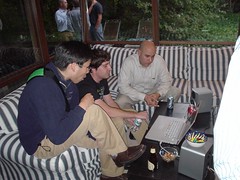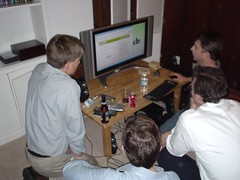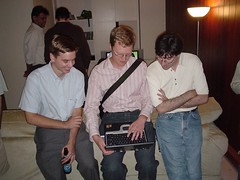I've been meaning to write this post for a long time, and I've finally been spurred by the emerging reality of
FM Publishing to lay out my thoughts before John Battelle goes and changes my mind.
I don't have a handy history of journalism at my fingertips, but I'd say that all of our model of how it's supposed to work is
Ben Franklin at Poor Richard's Almanack, or Cary Grant ande Rosalind Russell in
His Girl Friday. Those intrepid folks who go out and gather the news, and have a pretty direct and individual relationship with both their sources and their readers. That directness has been lost over the years, partly through the growth of society from Franklin's Philadelphia of perhaps 12,000 people, and partly through intervening layers of technology and bureaucracy and the rise of giant media conglomerates.
One of the things that these conglomerates have done is to vertically integrate, in order to maximize profit -- and if you look at the profitability of local newspapers and local television affiliates, still the repositity of the majority of journalism in this country, they are staggering.
In a previous post, I said that
editorial + reporting + advertising = news. Well, those three + distribution = media, and your typical newspaper or television puts them together like this:

The three major categories of blogging that first emerged were political blogs, technology blogs, and teenage girl blogs (aka LiveJournal). If we look at the blogging phenomenon across all three, what is apparent is that a blog is a way to express an individual editorial opinion about some body of knowledge or events, that can be pointed or linked to. Blogs are the superstructure on the ship, and must point to an engine room which drives them.
In the case of technology and political blogs, the bloggers pointed to the widely available volume of reportage available online; and the drumbeat, time-driven nature of political and technology news is kind of like a CPU clock, making sure that the conversations continue to be synchronized and move along in a nice orderly fashion -- today we talk about the iPod Nano and FEMA; tomorrow we talk about Sony's cool new gadets and the collapse of the stock market. Or whatever.
In the case of teenage girls, I don't know what exactly started it, but one day they were suddenly all online
gossiping about each other, and the content of their editorial layer was themselves, and intense recirocal linking activity unknowable to mere male mortals occurred.
I read several political blogs, and I get my news from the New York Times. The New York Times is either picking a moment in history to make its stand, or shooting itself in the foot right now, because they're closing a lot of their content off behind
a paid subscription wall very soon. But I'm not sure that I care - the only Times columnists I regularly read are Friedman and Krugman, and they are fairly formulaic at least 40% of the time. The guys that I do read --
Kevin Drum and
Josh Marshall, among others -- I find to be more interesting, more complete, and more persuasive on a regular basis. Once they actually get a business model figured out, Kevin or Josh should be able to make millions of dollars a year from expressing their opinions -- MORE than a Krugman or a Friedman can make, because they've gone free agent vs. the profit-maximizing intgrated media monopoly of the NYTimes or other big papers.
My take on
MySpace is that, without quite realizing what they'd done, they enabled and captured music blogging. We (by which I mean
NSVG) have done a lot of work with some big phone companies which has caused us to coin a phrase, the "Extended Conversation". Conversations today already happen across many mediums, and involve complex references, creation of content, commerce, and in many cases, actions. Politics is a huge area of conversations; technology another huge area; and teenage girls are the world's leading acknowledged source of conversations.
Music (specifically, hip emerging indie music) is a very fertile conversational area -- just watch the movie
Slacker to see -- and MySpace built a 'platform' of band sites, band schedules, band singles, and band photos that allowed the fans of those bands, the conversational participants, to all converge in one place, and to start expressing their opinions about music. Voila -- music blogging, and $500m. As other forms of content become widely available in linkable, bloggable form online, I think that we will start to see the emergence of whole new categories of blogging, which can't exist today because the foundations of linkable information are fragmented or have high hurdles to discovery and discussion.
Blogging is the wave of the future for editorial opinion. We'll have a whole class of financial blogs, movie blogs, gadget blogs, local blogs, food blogs, music blogs, political blogs, health blogs... you name it, it'll be blogged. Because as this ecology emerges, it will be the most profitable and interesting way for the best writers and editorial opinion creaters to express themselves.
This of course begs the question, what will happen to reporting and journalism, the ship on which this superstructure sails?
Dan Gillmor has and idea -
citizen journalism - that I'm not sure I entirely believe; and the short answer is that I don't know. But I'm quite certain where the editorial opinion layer will go, and blogs will lead the way.
So what is Federated Media? That speculation is the topic for yet another post. But I don't think it's a coincidence that a couple recent interviews of John have included the capitalized phrase, the
Force of Many.





 The most recent innovation (after the arrival of shaped charges) gaining popularity are infrared triggers for IEDs (improvised explosive devices). These triggers are a conversion of the simple "light" beams used in burglar alarms (see image) and as safety mechanisms on garage doors. The beams are activated remotely by radio controls when a patrol approaches. When the light beam is crossed the bomb goes off. Unfortunately, unlike radio controls the beams are not easily jammed. These new triggers have been used in numerous deadly attacks on British forces over the last several months.
The most recent innovation (after the arrival of shaped charges) gaining popularity are infrared triggers for IEDs (improvised explosive devices). These triggers are a conversion of the simple "light" beams used in burglar alarms (see image) and as safety mechanisms on garage doors. The beams are activated remotely by radio controls when a patrol approaches. When the light beam is crossed the bomb goes off. Unfortunately, unlike radio controls the beams are not easily jammed. These new triggers have been used in numerous deadly attacks on British forces over the last several months. 